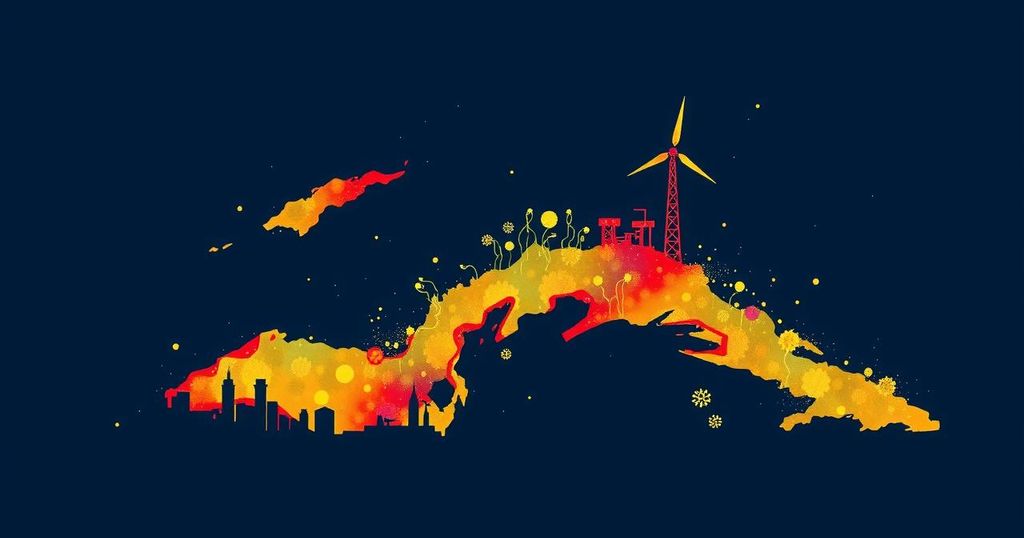Cuba is currently facing severe challenges stemming from a fragile energy infrastructure and a struggling economy. A recent nationwide blackout highlighted the country’s outdated power generation network reliant on fossil fuels. With inflation soaring and shortages of essential goods rampant, tens of thousands have protested against the government, leading to significant emigration. The combination of economic mismanagement, a tightening US embargo, and the impact of the Covid-19 pandemic has driven many Cubans to seek alternatives abroad, marking a pivotal moment in the nation’s history.
Havana finds itself in a state of turmoil, characterized by a nationwide power outage that has drawn attention to Cuba’s persistent economic struggles and the inadequacies of its infrastructure. On Friday, the island experienced a blackout following weeks of intermittent outages, which had extended to as long as 20 hours in certain provinces. The ongoing crisis has effectively stalled the economy, suspending non-essential public services, closing schools, and leaving traffic lights in the capital nonfunctional. This extensive blackout is symptomatic of a vulnerable energy framework reliant almost entirely on fossil fuels, with generation capabilities producing only about one-third of the required electricity. The underlying issues stem from an aging electricity grid and diminished investment, compounded by the restrictive US trade embargo which has tightened under the previous Trump administration. Cuba’s reliance on a limited number of antiquated coal-fired power plants, many operational for over four decades, poses significant operational challenges, including frequent breakdowns. To mitigate these problems, the Cuban government has engaged Turkish companies to lease seven floating power units and has implemented additional small diesel generators into the grid. However, securing adequate fuel sources remains problematic, primarily due to a sharp reduction in oil shipments from Venezuela, Cuba’s principal ally. Reports indicate that oil deliveries from Venezuela have dramatically decreased from approximately 33,700 barrels per day in June to just around 22,000 barrels per day by September. While alternative energy projects are underway, their progress is severely hampered by insufficient investment resources and the ongoing embargo. Cubans are currently facing profound economic hardships reminiscent of the crisis following the Soviet Union’s collapse in the early 1990s. The country is experiencing substantial inflation and significant shortages of essential goods, including food, medicine, and fuel. Although the government attributes this crisis primarily to the US embargo, Cuba also grapples with lingering effects from the Covid-19 pandemic which devastated its vital tourism sector and issues stemming from inadequate economic governance. The resulting discontent culminated in massive protests in July 2021, wherein thousands publicly expressed their grievances over governmental failures by declaring, “We are hungry” and demanding “Freedom!” One individual lost their life during this unrest, while hundreds faced detention or arrest. Despite attributing the protests to foreign meddling, the Cuban authorities responded by permitting the establishment of private businesses, marking a significant pivot in the nation’s economic policy. Further demonstrations occurred in 2022 due to persistent power shortages, resulting in more arrests. Although there were tentative improvements in energy provision in early 2023, the situation has again deteriorated, prompting renewed protests among citizens in Santiago de Cuba and other municipalities. Increasingly, many Cubans are losing faith in any potential for reform and are seeking asylum abroad, spurred by a dismal average monthly income of around 5,000 pesos. This surge of emigration represents the most significant outflow of people from Cuba since the 1959 revolution led by Fidel Castro. In the period from January 2022 through August 2024, over 700,000 Cubans are reported to have entered the United States, not accounting for additional individuals who may have migrated to other regions in Latin America or Europe without official records. In summary, Cuba’s current crises—ranging from energy breakdowns to economic stagnation—underscore the consequences of decades of infrastructural neglect, international sanctions, and an economy that has struggled to adapt to contemporary challenges. The growing dissatisfaction among the populace, illustrated by numerous protests and significant emigration, highlights the urgent need for comprehensive reforms to address both energy needs and economic viability. In conclusion, the interplay of Cuba’s infrastructural limitations, economic challenges, and political unrest has reached a critical juncture, producing significant societal outcomes. Whether the Cuban government can navigate these issues effectively will dictate the country’s future stability and the well-being of its citizens.
Cuba has long been under economic strain due to a combination of factors including a long-standing US trade embargo, dependence on outdated infrastructure, and more recently, the impact of the Covid-19 pandemic on its vital tourism industry. The energy crisis has intensified due to the ageing electricity grid and insufficient fuel supply, primarily from Venezuela. Furthermore, internal economic challenges have led to civil unrest, highlighting the public’s growing dissatisfaction with living conditions and governmental policies. The situation demands urgent attention from Cuban authorities, as the populace increasingly seeks viable alternatives abroad.
Cuba’s ongoing crises, particularly in energy and the economy, reflect deep-rooted issues stemming from decades of neglect and external sanctions. The combination of infrastructural decay, economic mismanagement, and significant social discontent has pushed many Cubans to seek a better life outside their homeland. For the survival and future stability of Cuba, it is essential that systemic reforms are undertaken to address both the immediate energy demands and the economic plight of its citizens.
Original Source: jordantimes.com






